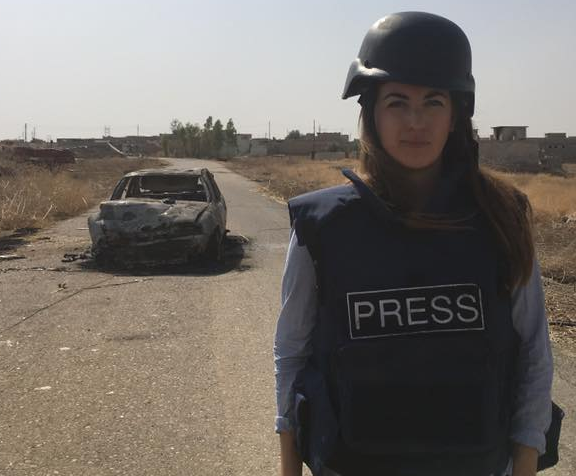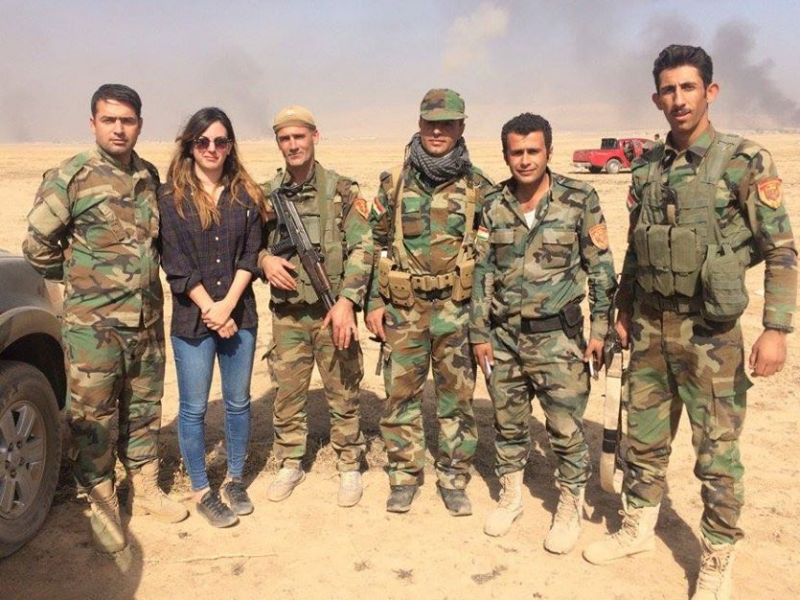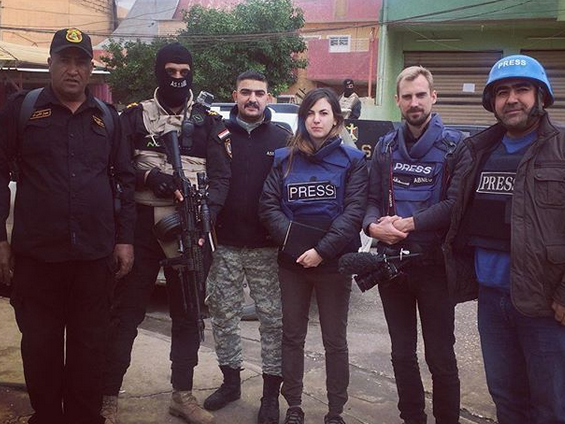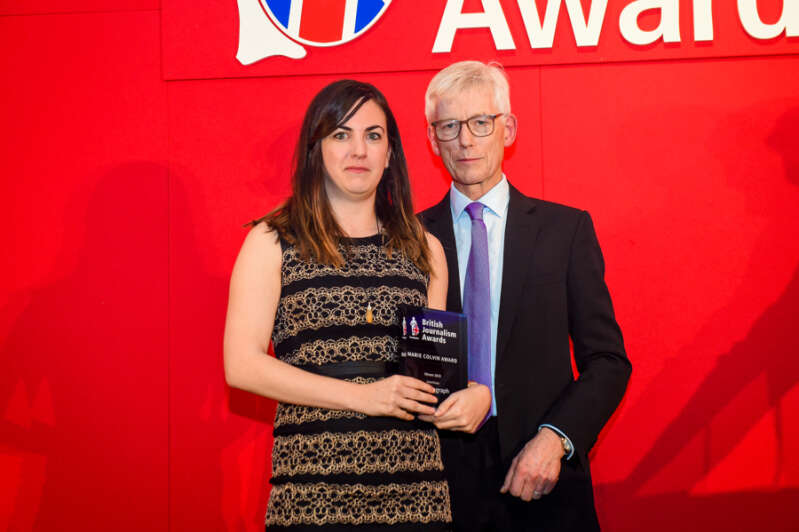
The Telegraph’s Middle East correspondent has said she was targeted by a Russian campaign to discredit her work on Syria and has spoken about the end of the “fetishization” of female war reporters.
Josie Ensor, who won the Marie Colvin Award at the Press Gazette British Journalism Awards last month, was praised by the judges for her “sympathetic but clear-eyed” reporting from north-east Syria.
Ensor told Press Gazette: “I don’t think we’ve seen anything quite like it in terms of the two different narratives that have been going on in Syria.
“I get called a regime change journalist all the time. I don’t support either side but you get accused of supporting the rebels because you report on the [Syrian] government’s atrocities.”

Telegraph Middle East correspondent Josie Ensor in the field. Picture: Sam Tarling
The civil war in Syria has killed hundreds of thousands of people while millions more have fled their homes. Syrian president Bashar Al-Assad’s regime forces have been supported by the Russian military.
Russia ‘tried to discredit my work’
Ensor said she and colleagues from the New York Times and Washington Post recently had their photos published online with captions calling them Al-Qaeda sympathisers because they had reported on civilian casualties in rebel-held Idlib and other areas.
She said she had also been the victim of a targeted disinformation campaign by the Russian government after reporting on a suspected chlorine gas attack on civilians in the city of Douma in April 2018.
“They started setting up fake Linkedin accounts and email addresses in my name trying to discredit my work,” she said. She also said a “big tech company” got in touch to warn her about it.
The disinformation attacks have added to an air of distrust in journalism currently plaguing the industry.
“People call you an armchair journalist even when you’re reporting from Syria,” Ensor said. “I had that once. I filed a report from Syria and they said: ‘What do you know, you’re just an armchair journalist’.
“It doesn’t even matter anymore if you go to the place and report what you see. There’s always going to be a side that has an inherent distrust of what you do because you are ‘mainstream media’.”
‘There is no free speech in Syria anymore’
Asked if she feared the issue could escalate beyond trust and into violence, Ensor added: “Definitely, I think so. It starts with these small erosions and then it builds up.
“We see how Russia treats journalists. They disappear and they’re found dead. They’re shot dead and they fall from balconies and in Syria it’s exactly the same,” she said.
“There is no free speech in Syria anymore sadly and all the independent journalists who are there are operating under extremely difficult circumstances.”
In terms of safety, Ensor’s biggest challenges were in Aleppo in 2016, when the Syrian government was about to start an offensive, and during the 2016/17 Battle of Mosul in Iraq which she described as “massively chaotic” with no real frontline or embedding of journalists.

Telegraph Middle East correspondent Josie Ensor in Mosul, Iraq. Picture: Josie Ensor
“We stayed a bit too long in one area in Mosul and mortars landed quite close to us and we had to take refuge in the basement of someone’s house,” she said.
“But I think if you’re scared the whole time you probably shouldn’t be in this kind of job and you have to have a disassociation when those sorts of things happen.”
Ensor, who has been based in Beirut for the Telegraph since 2016 after stints working for the paper in London and San Francisco, said she has also noticed an erosion of press freedom in the region.
She is keenly aware that Turkey, where she travels on occasion, is one of the world’s biggest jailers of journalists and said there are “limits on what you can report” – writing about the Kurds is off-limits.
‘You don’t clock off’
The British Journalism Award judges said Ensor’s work had made readers “identify with people they might otherwise fear – teenagers who ended up with Isis” in awarding her the Marie Colvin prize.
Ensor told Press Gazette she was motivated to tell the story of the “human cost of war” in a similar way to the Sunday Times war correspondent Colvin, who died in Homs, Syria, in 2012 while reporting on the conflict.
Pointing to one of her award-winning stories – “‘She’ll never know she had a mother who loved her’ – Yazidi women forced to abandon their babies born to Isil” – Ensor said: “Everyone was talking about the coverage that Isis perpetrators had been getting and thinking they’d been getting a lot of sympathy and a lot of airtime.
“I was reacting to a lot of the reaction on social media that we weren’t hearing about what had become of the victims.
“I thought it was important to revisit the Yazidi story to find out how they were living with the trauma of what had happened years on and the unintended consequences of what happened.”

The Telegraph’s Josie Ensor picks up the Marie Colvin Award from Bob Tyrer, a former editor of Colvin’s, at the British Journalism Awards 2019
Ensor said “a big part of the emotional labour of the job is just that you don’t clock off”, adding: “The story doesn’t just start and finish in the story that you’re writing.
“It takes months of communication and often continued communication afterwards and I think especially in difficult situations like this you sometimes become more than a journalist, you kind of become an advocate for these people.”
Female war correspondents no longer ‘fetishized’
Discussing how Colvin has been “inspiration” to many correspondents she knows, Ensor also praised Sky News’ Alex Crawford, Channel 4 News’ Lindsey Hilsum, and the BBC’s Lyse Doucet.
She said she believes female foreign correspondents have an edge over their male colleagues as they can both report sensitively and more intimately on women’s issues and sometimes “disarm” male interviewees who are not culturally accustomed to women asking questions.
But she added: “I think it’s great that there’s no longer this fetishization of female war correspondents. I don’t think we see that as much anymore. The picture bylines and the daring tales of bravery.
“I think in the Middle East at least about two-thirds of my colleagues are women and it’s no longer a defining feature. They’re not a female war correspondent, they’re just a war correspondent.
“I like that there’s more of us in the field now and it’s not such an anomalous occurrence anymore.”
Picture: Sam Tarling
Email pged@pressgazette.co.uk to point out mistakes, provide story tips or send in a letter for publication on our "Letters Page" blog

